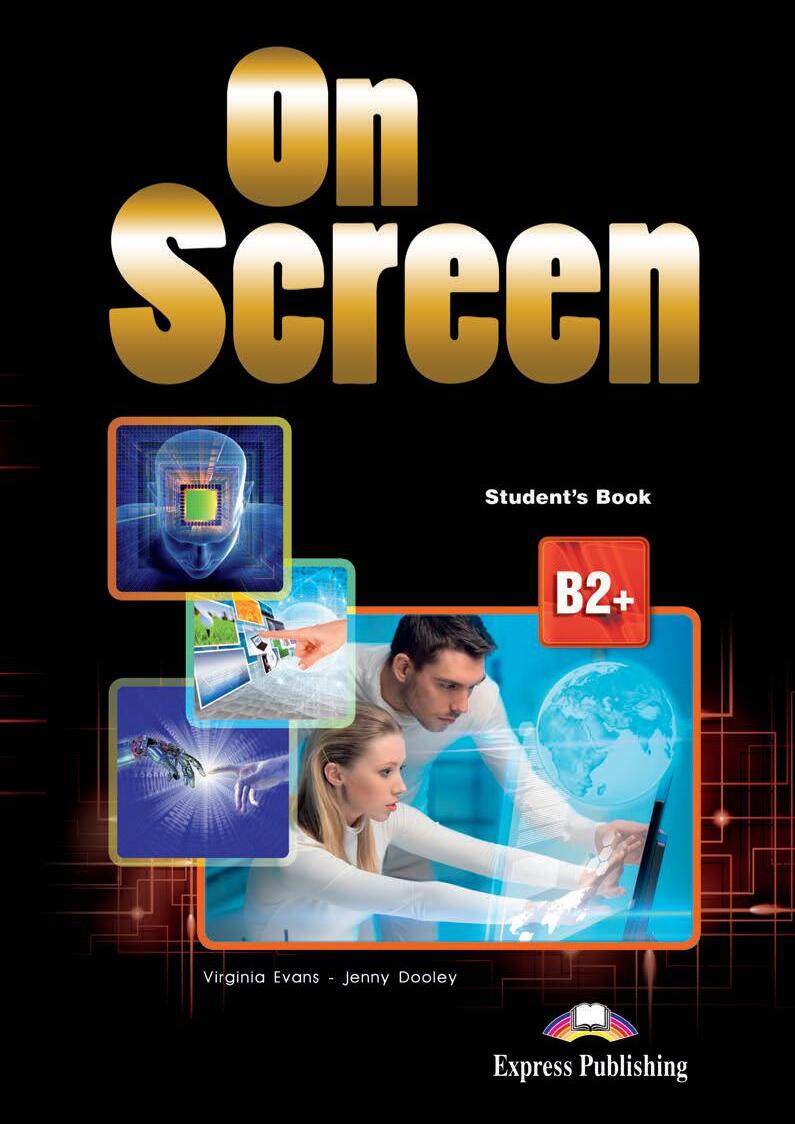

Work
Module 1

M ODULE O BJECTIVES
▶ Vocabulary
•jobs & money
•lifestyles
•character
•idioms
•phrasal verbs
•prepositions
•word formation
▶ Reading an article about a job (multiple choice, answer questions)
▶ Grammar
•present tenses
•future tenses
•relatives
▶ Listening
•an announcement (true/false statements)
•an interview (multiple choice)
•pronunciation /h/
▶ Speaking
•job interview
•compare photographs
▶ Writing
•a paragraph justifying your preference towards a job
•a letter of application
▶ Language Focus
•phrasal verbs
•prepositions
•word formation
•grammar in focus
▶ Progress Check
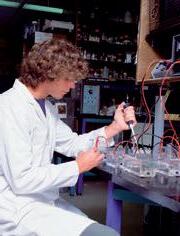
Which of these jobs can you see in the pictures?



•estate agent •lawyer •flight attendant
•mechanic •engineer •stockbroker
•firefighter •medical researcher

•au pair •gardener •fashion designer
•tour guide •florist •sales assistant
•builder •plumber •electrician


Complete the job adverts. Use these words:
•flexible •experience •qualifications •enclosing •full-time •references •salary •arrange
Au pair needed for help with 7-year-old boy and light housework. No 1) .................. needed but must be able to provide 2) ..................... .
Contact Mrs Hislop on 0209 568 9832 after 6 pm.

3) ... sales assistant required for large department store. Must have 4) ....................... in fashion retail. Monthly 5) ....................... payable. Please apply to Personnel Department, PO Box 2048, Croydon 6) ....................... CV.
We need a part-time gardener with 7) ........................ working hours to help with our large garden. Two references required. Please call 9167420637 (mornings only) to 8) ............... an interview.

Words of wisdom Discuss

“It doesn’t matter what job you do, it’s how you do it.”


Which of the jobs in Ex.1: are done indoors/outdoors? have career prospects? are well-paid/poorly-paid? have flexible hours? need a degree? need the most training?

What would you like to do for a living? Why? Tell the class.

Reading 1a

1

The man in the picture is nicknamed ‘The Sharkman’. What do you think his job involves?

2
a)These words appear in the text. Check them in the Word List.
•brought up •encounter •operation •predators •adapt •ferocious •immobility •interpret
Mike Rutzen has one of the most thrilling occupations you could possibly imagine. He is an expert in the secrets and behaviour of one of the most powerful and feared natural predators on the planet, the great white shark. Once a fisherman who was scared of this mysterious animal, Mike has learnt to admire and understand great whites, and now, he spends a large part of his time in their company. Mike’s passion for sharks goes beyond the limits of most shark experts, though. Believe it or not, Mike doesn’t simply observe sharks in a tank or in the oceans; he actually pets them, plays with them and even hypnotises them. He has developed such a special bond with sharks that he is now known as The Sharkman. Rutzen is not a scientist. In actual fact, he taught himself everything he knows about sharks. He was brought up on a farm in the South African countryside and knew nothing about sharks until he started working as a fisherman off the coast of Gansbaai, a fishing village near Cape Town. As tourism developed in the area, there arose a need for experienced boat skippers to take tourists out to see the sharks. Despite his natural fear of sharks, Mike gradually came to love these giant fish and developed a very close relationship with them. He took lessons in freediving so he could swim with sharks and he slowly learnt how to interpret their behaviour and adapt his posture to avoid being attacked. He soon decided that he wanted to work with sharks and started up his own cagediving business dedicated to sharing his passion for great white sharks.
Mike’s diving operation now specialises in locating and diving with great white sharks to provide people with the opportunity to experience a unique and unforgettable underwater encounter with these amazing creatures. Mike’s interest in sharks doesn’t end there, though. He has set himself the goal of changing the negative perception that so many people have of great white sharks. Through his interactions with sharks, he aims to show people that they are far from the ferocious and mindless killing machines that are portrayed in the media, but that they are curious, intelligent and sensitive creatures.
“They may be the top predator in the sea, but they are not the man-eating killers of our nightmares,” he says. He believes that great white sharks have personalities and enjoy interacting with people. Sharks see Mike neither as prey nor as predator and they happily allow him to swim alongside them. A shark will occasionally let Mike ride with it by hanging onto its dorsal fin. What’s truly surprising, though, is that these so-called ferocious killers even allow Mike to hypnotise them. By turning it on its head and massaging its snout close to its eyes, Mike can put a four-metre-long, 1,000 kg shark into a state of total immobility for about fifteen minutes. During this time, the shark will lie upside-down and rest on Mike’s hand; a sight that scientists can only marvel at
Check these words
•company •beyond the limits •bond •posture •dedicated to •encounter •perception •mindless •nightmare •dorsal fin •snout •marvel at •highlight •rewarding

The Sharkman has become a great champion of shark conservation, seeking to highlight the great white shark’s status as an endangered species and to raise awareness of the need to protect them. He regularly travels to give talks and lectures on the great white shark and he also makes documentaries about them. In Sharkman, a Discovery Channel programme, he tours the world and dives with different species of sharks, demonstrating his ability to hypnotise them. He also starred in an episode of the BBC’s Natural World. He not only has an exciting and rewarding job, but he is also, as is stated by the title of another BBC programme, ALiving Legend of Gansbaai.
3

4
b)Use the words in Ex. 2a to complete the sentences below.
1 Mike Rutzen works with sharks, one of the most feared ....................... on Earth.
2 Mike was ....................... in South Africa where he originally worked as a farmer.
3 He learnt to respect sharks and ................. their behaviour.
4 He also learnt how to ....................... his posture to protect himself from possible shark attacks.
5 The ....................... he runs specialises in feeding sharks.
6 Mike believes sharks aren’t ....................... animals, but are actually intelligent and sensitive creatures.
7 Mike can hypnotise sharks to hold them in a state of total ................... for about an hour.
8 Mike believes a(n) .................. with a great white shark is an unforgettable experience.
Which of the sentences in Ex.2b are true about Mike?
Listen and read to find out.
Read the text again. For questions 1-6, choose the correct answer A, B, C, or D.
Justify your answers.
1 Why is Mike different to most shark experts?
A He owns pet sharks.
B He gets hypnotised by them.
C He studies sharks in tanks.
D He builds strong bonds with sharks.
2 What led Mike to start his own business?
A his lack of work as a fisherman
B his need for more money
C his desire to be closer to sharks
D the demand created by tourists
3 Mike hopes his work will
A change people’s opinions of sharks.
B make more people interact with sharks.
C reduce the number of shark-related deaths.
D create more interest in sharks in the media.



4 How does Mike sometimes swim with sharks?
A by hypnotising the shark into following him
B by grabbing a part on the back of the shark
C by hanging onto the shark’s tail
D by stroking a part of the shark’s head
5 The phrase ‘a great champion of’ (ℓ. 37) means
A a person who always wins.
B someone who is highly skilled in their field.
C a person who fights for a cause.
D someone who is extremely popular.
6 Which of the following best describes the writer’s tone throughout the article?
A impressed C envious
B threatening D uninspired

5
Read the text again and answer the questions. Use your own words.
1 Name two jobs Mike had before he started his own shark-diving business.
2 How does Mike make sharks stay stationary?
3 What work does Mike currently do apartfrom shark diving?

6
a)Find words in the text which mean:
• Para A: jobs, desire, to watch, to form
• Para B: slowly, to decode, to change
• Para C: meeting, fierce, bad dreams
• Para D: sometimes, complete
• Para E: to emphasise, to talk
b)Explain the words in bold.

7 ICT
Find out more about Mike Rutzen’s work. Visit his website: www.sharkdivingunlimited.com
Takes notes and make a presentation about Mike Rutzen to the class.


Write or tell the class three things you have learnt from the text.
Would you like to do Mike Rutzen’s job? In three minutes write a few sentences. Tell your partner or the class.

Vocabulary 1b
Vocabulary from the text

1
Choose the correct word.
1 He has a natural/common fear of spiders.
2 He has a very close/attached relationship with these creatures.
3 Mike aims to rise/raise awareness of the need to protect these huge predators.
4 You need patience if you want to develop a special tie/bond with a wild animal.
5 His passion for sharks goes beyond the borders/limits of other shark experts.
6 Journalists and filmmakers portray/observe sharks as mindless killers, but they are actually sensitive creatures.
7 Mike has dedicated/committed his life to the well-being of great white sharks.

2
Fill in: perception, interact, marvel, specialises, stars, limits, ferocious.
1 Mike’s diving operation ......................... in taking tourists to see great white sharks.
2 Many people have a negative ......................... of these mysterious creatures.
3 It’s easy for Mike to ......................... with the sharks once he gets close enough.
4 Mike ......................... in a fascinating episode of Natural World about sharks.
5 Anyone can go inside a shark cage underwater and ......................... at the sharks.
6 He decided to face his fears and live his life beyond the
7 The Asian Cobra is a ......................... animal, notorious for killing a large number of people every year.
Topic vocabulary Jobs & Money

3 Character
4
Underline the correct word. Check in the Word List.
1 Arthur worked in a bookshop for 35 years then quit/retired/ discontinued/abandoned and lived off his pension.
2 The company made huge earnings/profits/benefits/money in 2011.
3 There is a consumer/applicant/buyer/customer at the counter waiting to be served.
4 I’ve got a new job at the university, so I’ve handed in my note/notice/warning/letter at the café.
5 John works well with his partners/comrades/colleagues/ candidates at the leisure centre.
6 Kate enjoys her new workplace, but she had much better pensions/perks/permits/promotions in her old job.
7 Mrs Harman doesn’t make us work long hours. She is a fair trainee/worker/employer/employee
8 My sister deals/directs/controls/runs her own business making clothes for children.
9 News spread quickly throughout the medical occupation/ profession/trade/work about the new treatment.
10 Julie holds a vacancy/chair/post/situation as a nurse in a children’s hospital.
11 The team/crew/personnel/people department are responsible for all new employee contracts.
12 Due to the scandal, Tim had to dismiss/resign/fire/sack from his position as Managing Director.

Which of the words best describes the people: goodnatured, moody, sentimental, self-conscious, conservative, relaxed, sensible, gullible, emotional, perfectionist.
1 James doesn’t like trying new things and is quite traditional. .........................
2 One minute Lisa is happy and the next she is sad.
3 David tries to make everything he does as good as possible. .........................
4 Laura often talks about the past with fond memories. .........................
5 It’s easy to trick Ken into believing something that isn’t true.
6 Peter gets easily embarrassed and always thinks people are judging him.
7 Kate is friendly to everyone she meets.
8 Greg’s calm and nothing seems to worry him.
9 Wendy always makes good decisions and is very mature for her age. .........................
10 Jane has strong feelings and often cries at films. ...............



Use the words below to complete the sentences.
•skinned •spoken •going •tempered •minded •headed •hearted
1 Philip doesn’t accept other people’s ideas. He’s rather narrow-......................... .
2 Paul didn’t get upset after his boss shouted at him. He’s very easy-......................... .
3 Michelle is really cold......................... . Yesterday, she refused to give a homeless man any change.
4 Richard is soft-.....................; he has a quiet, gentle voice.
5 Sandra can be quick......................... at times. She often gets angry for no particular reason.
6 Pamela is quite a big......................... person. She thinks she is smarter than she actually is.
7 He is thick- .....................; he isn’t easily upset by criticism.
Idioms

Match the idioms (1-5) in bold to their meanings (a-e).
a lazy and doesn’t do much exercise
b very tough
c extremely annoying
d is very kind
e old-fashioned
He is such a pain in the neck He keeps annoying everyone with his negative comments. Suzanne took in a stray cat yesterday. She has a heart ofgold
Even after Paul broke his nose, he kept on playing. He’s as hard as nails !
Henry can’t use a computer. He’s a bit behind the times
Phrasal verbs

Fill in: out of, on, out, down on, by. Check in Appendix 1.
1 We’ve run ........................ money. We’ve spent it all. (have no more)
2 Bob’s been putting money ........................ for his holiday all year; he’s saved over í600! (save)
3 He took ........................ a loan to buy his new car. (borrow money from a bank)
4 If he leaves his job, what is he going to live ........................? (have money to support yourself)
5 She spends too much money. She must cut luxuries. (reduce)
6 Please fill ........................ an application form and leave it with the secretary. (complete)
Prepositions

Fill in: from, for, in, on, with, under. Check in Appendix 2.
1 They congratulated him .................. his promotion.
2 He retired .................. his job at the age of 65.
3 He applied .................. the position of Sales Manager.
4 She specialises .................. family law.
5 She has no experience .................. sales.
6 I’m afraid he isn’t qualified .................. the post.
7 He’s responsible .................. twenty people at work.
8 She is able to work .................. pressure.
9 Teachers need to be very patient .................. children.
Word Formation

Complete the gaps with the correct word derived from the words in bold.
Mark Miller is self-employed and carries out a range of building, repair and 1) (maintain) jobs to the outside of tall structures. It takes from 2-6 years to train as a(n) 2) ............................... (profession) steeplejack. “The one thing you must have for this job is a head for 3) (high),” he says. Mark likes working outdoors, but it can be 4) ............................... (danger) carrying equipment and trying to keep your balance when it gets 5) (wind). He says that you have to be very careful. Mark often has to work 6) ............................... (social) hours such as weekends and evenings. Also, he often works away from home for 7) (extend) periods. It’s worth it in the end though. “It’s a great 8) ............................... (feel) when I finish and know that because of me beautiful buildings will continue to grace the skyline for a few years,”, Mark says.

Grammar in use 1c

b)Match the tenses (1-14) to their uses (A-I). 1 Present tenses
a)Put the verbs in brackets into the correct present tense.



2
I 1) (have) an extremely rewarding job as a medical researcher. I 2) (work) for a research institute for eight years and every day my colleagues and I 3) (conduct) different experiments in order to create new medicines that will help people who 4) (suffer) from chronic illnesses. My day 5) (start) at 8:00 am and sometimes I 6) (not/go) home till late at night. My work also includes attending conferences and lectures where I get the latest information in my field. Science 7) (evolve) very fast these days so it’s important for me to stay informed. One downside of my job is that it 8) (keep) me too busy. I 9) (not/have) a proper holiday with my family for over two years and I don’t spend as much time with my two sons as I’d like. So, I 10) (just/inform) my supervisor that since my colleagues and I 11) (not/work) on anything urgent at present, I 12) (take) a 10-day break, starting tomorrow! I 13) (already/tell) my family about it and they are thrilled! My kids 14) (pack) their bags for our holiday as we speak!
A actions happening at the moment of speaking

Choose the correct verb form. Justify your answers. Check in the Grammar Reference section.
1 Peter works/is working as a waiter in a restaurant.
2 The train leaves/is leaving at 7o’clock.
3 More and more people are recycling/recycle these days.
4 You are alwaysforgetting/ always forget to lock the door.
5 I think/am thinking of looking for a new job.
6 She takes/is taking Spanish lessons this summer.
7 John looks/is looking nice in his suit.
8 Tina is/has been a teacher for ten years.
9 They move/have moved to a bigger house.
10 His clothes are dirty. He is working/has been working in the garden all morning.
11 She has run/has been running around all day; she’s exhausted.
12 They have left/have been leaving for Los Angeles.

B emphasis on the duration of an action which started in the past and continues up to the present
C changing or developing situations
D permanent states
E actions happening around the time of speaking
F daily routines
G past actions which have a visible result in the present
H fixed arrangements in the near future
I recently completed actions

Future tenses
see pp.GR3-GR4
Identify the tenses in bold. Match them to their uses (a-g). 3
I think I ’ll apply for the job. Now that we have the money we are going to move to a bigger flat.
It’s cold. I ’ll close the window.
Look out! You are going to fall down.
This time next month, we’ll be flying to Rome.
He will have worked here for 10 years by the end of May.
By next month, he will have been living here for 10 years.
a predictions based on what we think
b on-the-spot decisions
c actions in progress at astated future time
d intentions
e actions which will be finished before a stated future time
f predictions based on what we see
g emphasis on duration of an action up to a certain time in the future
4

Put the verbs in brackets into the correct future verb form.
1 We ............................. (take) the 4 o’clock train to York tomorrow.
2 This time tomorrow, they ........................... (hike) in the Lake District.
3 Jeff ............................... (leave) by the time we reach the hotel.
4 They ............................. (finish) by Friday.
5 By March, they ............................... (work) here for two years.
6 Liam ................. (type) the report by noon.
7 It’s 7:00 o’clock. Jim ............................... (arrive) at the cinema by now.
8 He’s running very fast. He ........................ ( win) the race.
9 We ............. (have) a party at the weekend.
10 I wonder if he ............... (talk) to me again.

Complete the sentences.

Fill in: who’s or whose.

1 Peter, .................... uncle is a musician, is going to study Music.
2 Mr Roberts is a person .................... highly respected by his students.
3 This is the person .............. got a red Volvo.
4 That’s the boy .......... my next-door neighbour.

Continue the sentences. Use relative pronouns/adjectives.
1 I like watching films .................................
2 I don’t like people ....................................
3 I’ll never forget the time ...........................
4 The hotel ................................................

Put the verbs in brackets into the correct tense. Then complete the gaps.
1 Derek, ........................ performance at work (not/be) that good lately, is at risk of being passed over for promotion.
1 This time next week, I’ll be ......................
2 By the end of this month, I’ll have ...........
3 This weekend, I’m ...................................
4 I don’t think I ...........................................
5 It’s very hot. I .......................................... 5
Defining/Non-defining relative clauses


People who/that visit the museum are not allowed to use their cameras. (Which people? Those who visit the museum - defining relative clause) Peter, who is studying Law, wants to join a big law firm to practise. (Non-defining relative clause) see p.GR5

Fill in the correct relative pronoun or adjective. Then add commas where necessary.
1 She is the girl .......... works with us.
2 Is that the man ......... project won the prize?
3 I’ll never forget the day ......... I first met Harry.
4 Lucy ......... contract expires next week is looking for another job.
5 What’s the name of the river ......... runs through London?
6 Paul’s new laptop ......... cost him £500 has broken down.
7 Who is the girl ......... is waving to us?
8 Ben ......... is only thirty years old owns his own business.

2 By lunchtime Mr Smith ............................ (interview) fifteen job applicants, four of .................... will attend a second interview.
3 I ........................ (never/meet) a tour guide ........................ knows as much as this one.
4 Let me check the report one more time and I (send) it to you by email as soon as I (finish)
5 Being an au pair is one of the tiring jobs I’ve ever had so I (think) of looking for something else.
Key word transformations
Use the words in bold to complete the second sentence so that it means the same as the first. Use two to five words.
1 Tom moved to Paris two years ago. SINCE It ..................................Tom moved to Paris.
2 She didn’t know who it belonged to. WHOSE She had no .........................................was.
3 He hasn’t turned up yet. STILL He .........................................................up.
4 I’ve never seen such a pretty girl. EVER She’s the ............................................seen.
5 We haven’t heard from Bob since May. NEWS We..............................from Bob since May.

Present yourself to the class. Talk about: what you do, what a typical weekday of yours is like, what your plans for the future are, what you are doing this weekend.

1d Listening skills

a)You are going to listen to two announcements about missing people. Before you listen, check these words in the Word List.
•footwear •separate •approximately •ponytail •anorak •dungarees •backpack •member of staff •situated
b)Listen and complete the sentences.
A1 The child got lost in the shop’s ..................................... department.
2 She was visiting the shop with
3 The colour of her backpack is
4 You can find the Customer Enquiries Desk on ..................................... .
B1 Brendan Maguire has disappeared from the ..................................... building of the airport.
2 He went to the café with
3 He moves around with the use of a
4 If anyone has information about him, they should go to ................................ .

2
Listen again and decide if each sentence is True or False.
A1 The child’s mother had been looking at shoes.........
2 The little girl is wearing her hair loose over her shoulders.........
3 She is dressed in a skirt.........
4 Her mother is advised to speak to a sales assistant.
5 The Customer Enquiries Desk is next to the restaurant.
B1 Brendan Maguire had been in the airport for less than two hours.........
2 His son left the café to go to Level Two.
3 Mr Maguire is going bald.........
4 He was wearing a scarf that matched his gloves.
5 A description can be given to the Information Desk.
3

a)You are going to listen to a job interview. Before you listen, check these words in the Word List.
•faint •adjust •animator •pursuit •contemporary dance •determined •fluent •graduate •motivate •contract •fee
b)Listen to a job interview. What job is Pamela doing at the moment?
c)Listen again and for questions 1-7, choose the best answer, A, B or C.
1 At the beginning of the interview, Pamela has difficulty
A connecting to the Internet.
B hearing the interviewer.
C finding the volume control.
2 Pamela would like to work as a hotel animator
A because she thinks it’s a fun job.
B as it’s an opportunity to meet new people.
C because it suits her personal interests.
3 Pamela gave up dancing, because she A wanted to travel abroad.
B didn’t take part in the shows.
C had to finish her studies.
4 The job in the travel agent’s
A involves face-to-face contact with customers.
B is only a six-month temporary position.
C pays better than the dance company.
5 A hotel animator is required to A encourage guests to participate in activities. B get involved in as many activities as possible. C have a three-year university degree.
6 The job in the Italian hotel
A includes free accommodation.
B requires a knowledge of water sports.
C lasts for six months.
7 Before starting her new job, Pamela will A receive some formal training.
B sign a contract at the agency.
C pay the agency a fee.

4
Pronunciation \h\ Listen and say. In which words is \h\ silent? •hard •hour •honest •hotel •when •honour •happy •highly

Speaking skills 1e
1

Job interview
a)Complete the dialogue. Use the words and phrases in the list.
•Do you have any relevant experience
•Have a seat •when can you start
•Thanks for coming in.
•tell me a bit about yourself
A:Hello. You must be Paul Martin.
B:Yes, good morning.
A: 1) ................................, Paul. I’m John Jones.
B:Nice to meet you.
A:So, 2) .................................................., Paul.
B:Well, I’m 18 years old, I’m a university student and I want a part-time job to help with my living expenses.
A:Okay. Why should I consider you for this job?
B:Well, I’m hardworking and efficient and I work well in a team. I’m also cheerful and friendly.
A:I see. 3) ........................................................?
B:Yes. Over the last two summers I worked as a waiter for a catering company at a variety of events. I have a letter of recommendation here.
A:Thank you. Should I offer you the job, 4) ...............................................................?
B:Right away.
A:OK. 5) ..................................I’ll be in touch.
B:Thank you very much. I hope to hear from you soon.
b)Take roles and read the dialogue aloud.

Your local supermarket is advertising for parttime shop assistants. In pairs use the language in the box to act out a job interview. Use the dialogue in Ex. 1 as a model.
Interviewing a person for a job
•Please, have a seat.
•Tell me about yourself.
•Why should we consider you for this job/employ you?
•Why do you want this job?/Why do you want to work here?
•Do you have any relevant experience?
•When can you start?
Replying
•Thank you.
•I’m ... old, ...
•I’m ( hardworking, kind, caring, sensible, etc.)
•I want to ...
•I have worked as ...
•Right away/ Next week.
3

Making comparisons
Which professions can you see in the photographs? What are some of the ways in
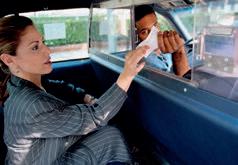




1)Both/As doctors and taxi drivers have interesting jobs 2)but/in spite their jobs differ in many respects. 3)Although/Despite no special skills are required for being a taxi driver, becoming a doctor requires years of training. Both jobs require working nights and weekends. 4)However,/Also, doctors have a safer job compared to taxi drivers who are often the victims of crime. Both jobs can be very stressful 5)but/despite a doctor’s job is more rewarding 6)as/on the other hand they change people’s lives for the better. 7)Inaddition,/Nevertheless, doctors earn more money than taxi drivers.

A

Look at pictures A and B below. Use the phrases in the language box and the ideas below to compare the two professions.

Baker
•not dangerous job
•once mastered, no new skills to learn
•happy work environment
•work long hours every day
•poorly paid

B

Firefighter
•hazardous, risky job

•requires constant training
•witness people getting hurt
•shift work
•financial security
Contrasting ideas
•Both ... and ...
•Compared to
•In addition,
•Also,
•Although + clause
•Despite + - ing form/noun
•On the other hand,
•However,

Writing A letter of application

1

Rubric
analysis
Apply to inquiries@BrightonSummerCamp.co.uk Writing Bank 1 p.
Read the rubric below, paying careful attention to the underlined words and phrases. Then answer the questions that follow.
You have seen the following advertisement for a summer job and have decided to apply. Write your letter of application. You should write between 140 and 190 words

Model
analysis
a)Read the model and replace the informal phrases in bold (1-8) with the formal ones (A-H).
I would be glad I am interested in I feel I would be well suited for this position
I am writing to
Yours faithfully,
I have no work experience in this area I look forward to hearing from you I have a good command of
Dear Sir/Madam,
is looking for young people aged 18-24 to work as group leaders at the camp during the summer months. You will help organise sports and activities for children 10-15 years old. Must be fluent in English. Noprevious experience required.

1) I want to apply for the position of group leader in your camp which was advertised in yesterday’s College News. 2) I like this job since I enjoy working with children.

I am twenty-two years old and am currently studying Nursing. In addition 3) I’m really good at English.

4) I haven’t done anything like this before , but I have often done babysitting and have participated in various sports activities for the last seven years. 5) I’m sure I’ll be good at this job because I am enthusiastic, creative and energetic. I am also very patient with children.

1 Who is the target reader?
2 What information should you include in the introduction?
3 How many main body paragraphs will you write? What should they contain?
4 Which of the following beginnings and endings are appropriate? Give reasons.
Dear Bob,
Yours, Tony
Dear Sir/Madam,
Yours faithfully, Anthony Milles
Dear Mr Jones,
Yours sincerely, Anthony Milles
6) I want to attend an interview. I am available at any time. 7) Can’t wait to hear from you 8)Yours , Anthony Milles Anthony Milles

b)Suggest an alternative beginning and ending for this letter.

Which paragraph contains: when available for interview, contact details, closing remarks? work experience & character? age, what he is doing now, qualifications? opening remarks & reasons for writing?
4

Error correction
The model below is not a suitable letter of application. Correct the underlined mistakes. Think about:
•unnecessary words •wrong tenses •missing words •punctuation problems •language too informal •wrong prepositions •wrong word order •incorrect greeting/ending • -ing form/infinitive mistakes
Hi Harold,
I am writing this letter to ask you for the job I saw advertised in the local newspaper.
I am 19 old years and am currently studying Economics at York University. I am very fluent with French and also am having a first-aid certificate.
I think I would be very good group leader at your camp. I have a lot of experience working with children as I was babysitting my neighbours’ children since I have 15 years old. Also, last year; I worked as a lifeguard at a children’s pool. I am a responsible person and punctual person who will not let you down.
I’ll meet you for an interview any weekday afternoon. My telephone number is 210-4547425. See you soon, Lisa
Your turn

5
Read the rubric and answer the questions.
You have seen the following advertisement for a part-time job.
The Leeds Times 16, Kent Street, Leeds

Would you like to experience what it’s like to work in the most popular daily newspaper in Leeds? We are looking for young enthusiastic people (18-22 years old) to work as part-time writers for our Young People’s Magazine. You do not need any experience in journalism, but you should be interested in local cultural and sports events and own a laptop.
Please apply in writing enclosing a CV to our Personnel Department.
Write your letter of application (140-190 words).
1 What do you have to write?
2 Who is the target reader? What style is appropriate?
3 What would be a suitable first sentence?
4 What information should you include in the main body?
5 How could you start/end your piece of writing?

6
Use your answers to write the letter. Follow the plan. Use phrases from the Useful Language box.
Useful Language

•I am writing to apply for the position of … advertised in (yesterday’s) …
•With reference to your advertisement in …
•I have been working as a … for the last … years.
•I will be available for an interview …
•I look forward to hearing from you.
•I am available for an interview any weekday morning.
•I would be grateful if you would consider me for the post.
•I consider myself to be (punctual, hardworking, etc)
•Despite my lack of experience, I feel that I would be …
•I enclose a reference from my previous employer.
•I can be contacted by telephone on …

Dear Sir/Madam,
Introduction
(Para 1) formal greeting, reason for writing, where post was advertised
Main Body
(Para 2) what you are doing now (Para 3) reference to past work experience/character
Conclusion
(Para 4) when available for interview, contact details; closing remarks
Yours faithfully, + (your full name)

Checklist
When you finish writing your letter check for the following:
•Have you used appropriate opening/closing remarks?
•Are there well-structured paragraphs?
•Have you written in formal style?
•Are there any grammar/spelling/ punctuation mistakes?
•Have you used an appropriate formal greeting/ending?

Language Knowledge 1
1

For questions 1-8, read the text below and decide which answer (A, B, C, D) best fits each gap. There is an example at the beginning (0).

Research has revealed some worrying 0) C in the way young people are 1) ...... their lives. Bad eating habits are at the top of the list, with many youngsters eating too much of the wrong thing. Health experts warn that the 2) ...... of large quantities of junk food puts children in 3) ...... of becoming obese and developing serious health problems later on in life.
The sit-down lifestyle led by children today is also a major cause for 4) . Preferring to sit for hours at a computer screen chatting instead of actually going out and mixing with friends is a growing 5) ...... among young people, causing them to become more anti-social. Moreover, the combination of lack of exercise and too much sitting, with eating too much unhealthy food is a 6) ...... for disaster. There are, however, ways of tackling these problems. For example, youngsters and their parents can make sure they have a 7) ...... diet consisting of five portions of fruit and vegetables a day. Moreover, children should limit their time on the internet and take the opportunity to meet with friends in their free time. They could even 8) ...... a club or society where they could make new friends. One thing is for sure, a lifestyle of junk food and lack of exercise is certainly not one worth dying for.
2


0A movements C trends
B developments D fashions
1A leading C having B running
2A conservation
consumption
3A jeopardy
risk
4A concern C worry B trouble
5A pattern
B tendency
6A way
B method
7A weighed
B equalised
8A join
B connect
model
custom
prescription
recipe
balanced
stabilised
unite
link
Complete the second sentence so that it has a similar meaning to the first sentence. Do not change the word given. You must use two to five words, including the word given. Here is an example (0).
0 Abigail was really surprised when she got the job. EXPECT
Abigail did not expect to get the job.
1 I do not want to go to the gym. FEEL
I ................................................................ to the gym.
2 I’ll come and get you after work. PICK I’ll .............................................after work.
3 I’m sure that Jamie got the job. DOUBT There’s ...................................................... ...............................that Jamie got the job.
4 Everyone said Peter ruined the presentation. BLAMED
Everyone ................................................... ........................................the presentation.
5 I threw away a lot of things when we moved to our new office. RID
I .....................................................a lot of things when we moved to our new office.
6 My bus broke down this morning, so my brother drove me to work. LIFT
My bus broke down this morning, so .......... ................................to work by my brother.
7 We have no ink for the printer so you’ll have to order some. RUN
We .......................................................ink for the printer so you’ll have to order some.
8 Do you think you could help me with my homework please? WONDERING
I .................................if you could help me with my homework.
3

Complete the gaps with the correct form of the words in capitals.
1 Philip doesn’t like job interviews, but he doesn’t have a ........................ (CHOOSE)
2 A ..................large number of people would rather be happy than wealthy. (SURPRISE)
3 Isabelle felt .................... being interviewed by three people. (COMFORT)
4 His performance at the race improved ...................... after training hard for weeks. (CONSIDER)
5 I gave Simon the promotion because he is both ........................... and extremely good at his job. (RELY)
4

Grammar
Choose the correct item.
1 This report is extremely well-written. I’m very pleased ........ it.
A to B with C of D for
2 “Is Shelley here?”
“No, she hasn’t finished work ........ .”
A yet B still C already D now
3 The boss is waiting for you. You ........ to be here half an hour ago!
A have supposed C are supposed B were suppose D were supposed
4 “Joshua looks very happy.”
“Yes. Apparently he expects ........ a promotion at work.”
A getting C to have get B to get D to be getting
5 “........ for a living?”
“I’m a chemical engineer.”
A How do you do C How are you doing B What are you doing D What do you do
6 “Did you enjoy the seminar?”
“No, it was ........ .”
A a bore B boredom C boring D bored
7 Helen is a great boss, ........ John is not.
A when B whereas C despite D unlike
8 Your annual leave will have to be approved by both your supervisor ........ the boss.
A also B nor C or D and
9 I have to decide ...... I want the job by next week.
A however C whether or not B if or not D whereas
10 “Can you explain why you are always late for work?”
“There must be some ........ . I’ve never been late for work.”
A mistakes C mistaken B mistake D mistaking
11 “Did you go to the office Christmas party?”
“Yes, but it was a big disappointment. Only six people showed ........ .”
A up B off C in D out
12 You ........ to your manager before you book your holiday.
A spoke C go to speak B had to speak D should speak
5


Language Knowledge
Vocabulary
Choose the correct item.
1 Ignoring environmental issues now could ........ to greater problems in the future.
A see B guide C turn D lead
2 The Roman treasure had been ........ underground for nearly two thousand years.
A dug B excavated C vanished D buried
3 The government needs a new ........ for tackling unemployment.
A strategy C methodology
B planning D scheme
4 I couldn’t send the files because I lost my Internet
A link B connection C network D contact
5 The plans for the new children’s playground were ........ by the council today.
A discovered C exposed B revealed D uncovered
6 It was not ........ for Alex to wear jeans to his sister’s wedding.
A fitting C suitable
B matching D appropriate
7 I was annoyed when Lydia ........ the magazine I was reading and took it for herself.
A caught C snapped
B grabbed D grasped
8 I only ........ out of the window, so I didn’t notice what the man was wearing.
A glanced C glimpsed B peered D watched
9 The train ........ the station very slowly because of the snow on the track.
A arrived C reached B neared D approached
10 The ........ price is $5 for adults, but children don’t have to pay.
A permission C submission B admission D intermission
11 I ........ that we spend $350 a month on food.
A counted C charged
B calculated D valued
12 David ........ to climb Mount Kilimanjaro despite having a broken toe.
A accomplished C managed
B achieved D succeeded

Language Focus 1

Fill in:
Word formation
3

Complete the gaps with the correct form of the words in bold.
1 Tourists can ...................... sharks and whales from the safety of a boat.
2 This equipment can ...................... if there are sharks swimming in the area.
3 Steve wasn’t wearing his glasses, so he couldn’t ...................... what type of shark was swimming alongside the boat.
4 He hopes to change the way people ...................... the behaviour of great white sharks.
5 The company aims to ...................... diving gear to all the tour companies in the town.
6 Mike is able to ...................... for his family by operating a shark-diving company.
7 It’s important to ...................... your boat with all the necessary diving apparatus and safety gear.
8 The new boat tour company will ...................... to people interested in seeing marine animals.

1 Being a deep-sea diver is a thrilling (OCCUPY)
2 Sharks are ................................... animals. (MYSTERY)
3 Mike has developed a close with some sharks. (RELATION)
4 The job offers the ................................... of working abroad. (POSSIBLE )
5 Swimming with dolphins is an experience. (FORGET)
6 He is a ................................... . (PERFECT)
7 Ann gets ................................... very easily. (EMBARRASS)
8 Susan is a very ................................ person; I’m sure her advice will help you.
Grammar in Focus

Complete the gaps with an appropriate word. Then put the verbs in brackets into the correct form.


9 Mike doesn’t ...................... of the way sharks are portrayed in the media.
10 The shark’s fins ...................... it to m aintain balance in the water.
11 Some sharks ...................... Mike hy pnotise them.
12 Mike refused to ...................... more than ten people onto the boat for safety reasons. •discern •detect •observe•perceive
Phrasal verbs & Prepositions

Choose the correct item.
1 He applied in/for the position of sales assistant.
2 Jane puts money out/by each week for a new bike.
3 I’ve run out/down of money. Can you lend me £ 10?
4 They decided to take out/down a loan to buy a flat.
5 Congratulations with/on your new job.
6 He can’t work in/under pressure.
7 She has no money to live on/by
8 He specialises on/in computer engineering.
How would you like to eat chocolate all day and get paid for 1) (do) it? Well, that’s what would happen if you 2) ...................... (be) a chocolate taster and product development manager 3) Sally McKinnon from Scotland.
Sally works 4) ...................... Tesco, the supermarket chain, and she 5) (think) that her job is the best 6) ...................... the world. She has chocolate on her desk every day and gets to choose 7) ...................... chocolates the supermarket sells for special occasions like Valentine’s Day and Mother’s Day. She also gets to go on business trips to Belgium, Paris and New York to sample new products by 8) ...................... best chocolate makers.
Sally became a chocolate taster after 9) (study) for a degree in Food Science at Aberdeen University. She worked in different departments for a while developing products such 10) sandwiches, desserts and sushi before moving into chocolate. Her love of food was a great asset as was her interest 11) .................... food issues like allergies.
If you find a job like hers interesting, but you 12) (not/like) chocolate, it’s not a problem. Working 13) ................. a big food company means there are similar opportunities 14) other areas like tea or coffee tasting.



Just how smart are birds? Until recently, birds were thought of as being at the low end of the intelligence scale - hence the uncomplimentary term ‘birdbrain’. It turns out, however, that our feathered friends are far from stupid. They can actually be counted amongst the smartest creatures on the planet. One woman who knows this better than most is famed animal psychologist, Dr Irene Pepperberg.
Pepperberg was born in 1949 in New York City. An only child, she kept parakeets as pets and taught them to speak. While studying for a PhD in Chemistry at Harvard University, Pepperberg happened to see a documentary about animal intelligence. Fascinated, she immediately decided she wanted to change fields, but her professors discouraged her, so she continued her Chemistry studies. Nonetheless, in her spare time, Pepperberg began reading everything she could about animal intelligence.
In 1976, after completing her degree, Pepperberg walked into a pet shop and purchased a one-year-old African Grey parrot with the idea of studying him. She called the parrot Alex, for ‘Avian Learning Experiment’. For the next three decades, until Alex’s premature death in 2007, Pepperberg dedicated herself to seeing just what Alex was capable of learning.
Before Pepperberg's work, it was widely believed in the scientific community that a large primate brain was required to handle complex problems related to language and understanding. Pepperberg proved otherwise. She showed Alex could understand and use English on his own initiative. Alex learnt to use phrases along the lines of, "I want X" or "I want to go to Y" and clearly meant them to express genuine desires.
Alex also grasped the concept of certain categories, including bigger and smaller, and same and different. He could identify fifty
Reading

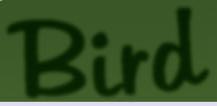
1 Progress Check

Researcher
different objects, recognise numbers up to six, and distinguish seven colours and five shapes. Alex even understood the concept of zeroif asked the difference between two identical objects, he would answer “none". His vocabulary stood at about 150 words, but Alex didn’t just imitate human speech as pet parrots often do. He comprehended what he said. For instance, after learning colours, Alex asked what colour he was. He learnt ‘grey’ after being told the answer just six times.
Pepperberg attributed Alex's ability to reason and process complex information to her training methods. When starting out, Pepperberg adopted some of the techniques used by the previous generation of researchers, but she rejected others as flawed. Pepperberg believed, for instance, that the traditional training method of giving birds unrelated rewards (e.g. a food treat) when they learnt to do something correctly simply caused confusion. So she trained Alex using related rewards. This meant she would reward Alex with the object he correctly labelled rather than an unrelated object. When Alex correctly identified a cork, for example, he was given the cork as his reward, not his favourite food, a cashew. To ‘sweeten’ the task, however, she would then allow Alex to request a nut or a slice of banana.
Alex became an international celebrity during his lifetime; so much so that when he died unexpectedly in 2007, his obituary appeared in publications all over the globe - from the New York Times to the Economist. Alex was learning till the very end, getting his head around the number seven and enjoying teaching the two younger parrots in Pepperberg’s lab - 12-year-old Griffin and 8-yearold Arthur - telling them to "talk better" when they mumbled their words. "Alex was so extraordinary in breaking the perceptions of birds as not being intelligent," says Pepperberg. “He had the emotional maturity of a 2-year-old child and the intellectual capabilities of a 5-year-old.” Alex was, in short, no birdbrain.
Read the text and decide which answer A, B, C or D is correct.
1 From the text, we can infer that the term ‘birdbrain’
A would not be used by Irene Pepperberg.
B means a person who acts in a rude manner.
C is not in general use anymore.
D was coined by researchers studying bird behaviour.
2 Pepperberg’s desire to work with animals
A developed slowly over many years.
B decreased during university studies.
C began as a child.
D came about unexpectedly.
3 In paragraph C, we learn that Alex
A was named after a famous experiment.
B was not bought as a pet.
C lived an unusually long time for a parrot.
D was not born in the wild.
4 Alex communicated in English
A without being prompted.
B only when he wanted something.
C saying letters when he didn’t know a word.
D often with phrases he made up himself.
5 Compared to other parrots, Alex spoke English
A with a better pronunciation.
B using a wider vocabulary.
C with actual understanding.
D using grammatical structures.
6 According to Pepperberg, food rewards when training a bird
A do not motivate a bird to learn.
B make the learning of complex tasks impossible.
C slow down the learning process.
D should be used only occasionally.
19 (6x2=12)

Progress Check 1
2

Speaking
Choose the correct response.
1 A:I’m John Smith.
B: a Nice to meet you! b Good morning.
2 A:Have a seat.
B: a I see. b Thank you.
3 A:When can you start?
B: a Right away. b I’ll be in touch.
Listening

Listen to a careers talk about being a paramedic and decide if the following statements are True or False.
5

Grammar
Put the verbs in brackets into the correct tense.
1 A:............................ (you/hear) from Jane?
B:No. I sent her an email two days ago but she ............................ (not/answer) it yet.
2 A:I ............................ (think) about applying for the job vacancy at that new shop.
B:I wouldn’t bother. I (think) it’s been filled.
3 A:Kim ............................ (start) working for a law firm this week and she’s very happy.
B:Lucky her! I ............................ (look for) a job for two months now, but I (not/find) one yet.
4 A:What ............................ (you/do) tonight?
1 Liam saves lives every day.......
2 He usually works 9 hours a day.......
3 He checks the vehicle at the end of every shift.
4 Liam likes it when he has a busy day.......
5 At first, Liam wanted to be a doctor.......
3 (3x2=6) (5x2=10)
Vocabulary

Fill in: designer, assistant, retire, company, encounter, perception, highlight, personnel, resign, profits.

B:I ............................................ (prepare) for my presentation tomorrow and I don’t think I (finish) before midnight.
5 A:.......................... (you/wait) here for long?
B:Actually we (just/arrive)
(5x4=20)
Fill in an appropriate relative.
1 Many people’s ........................ of sharks is that they are dangerous animals.
2 I prefer to spend my time in the of people who share the same interests as me.
3 Mike works hard to ........................ the need to protect great white sharks as they are an endangered species.
4 Jane loves clothes. She wants to be a fashion ........................ when she grows up.
5 Lisa had an unforgettable ........................ with dolphins while swimming in the Caribbean.
6 Kate has an interview with someone from the ..................... department this afternoon.
7 Pat has a part-time job in a boutique as a sales
8 Owen is going to ........................ from his job and go into business for himself.
9 The company saw a huge drop in ........................ over the last two years and had to let some staff go.
10 James will be able to ........................ next year after 35 years on the job. 4 (10x2=20)
7

1 Thursday at 2 pm is ........................ I have got an interview for a job.
2 Lawyers are people ...................... represent people in court.
3 Paul, dad owns the company, works in the warehouse.
4 The company ....................... I worked for 20 years has closed down.
5 I’m interested in the job vacancy is advertised on your site.
6 (5x2=10)
Writing
Read the rubric, then write your letter of application.
You have seen an advert for a part-time job at a fast food restaurant. Write your letter of application (140-190 words).
Check your progress (22 marks) (Total=100)
about jobs &
about character

a job interview
photos
a letter of application



On Screen B2+ is a modular course at CEF Level B2+. The course combines active learning with a variety of lively topics presented in eight themed modules.
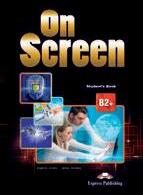

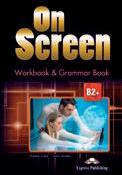


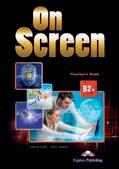
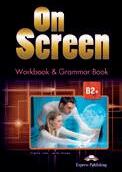




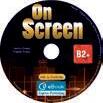






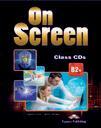


























fully interactive containing documentaries & videos thematically related to the topics of the course and worksheets
Student’s audio
